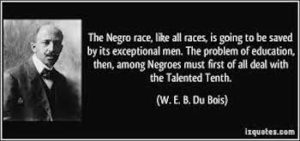
*On this date in 1903, The Talented Tenth is briefly defined. This term designated a leadership class of Blacks in the early 20th century.
Northern white philanthropists created the term, then publicized by W. E. B. Du Bois wrote an influential essay of the same name, published in 1903. It appeared in The Negro Problem, a collection of essays written by Booker T. Washington, Du Bois, Charles W. Chesnutt, Wilford H. Smith, H.T. Kealing, Paul Laurence Dunbar, and T. Thomas Fortune. The phrase "talented tenth" originated in 1896 among Northern white liberals, specifically the American Baptist Home Mission Society, a Christian missionary society strongly supported by John D. Rockefeller.
They aimed to establish more Black colleges in the South to train Black teachers and elites. Du Bois used the term "the talented tenth" to describe the likelihood of one in ten Black men becoming leaders of their race. He saw this group influencing the world by continuing their education, writing books, or becoming involved in social change. He strongly believed that Blacks needed a classical education to reach their full potential, rather than the industrial education promoted by the Atlanta compromise, endorsed by Washington and some white philanthropists.
Seemingly sexist in the 21st century, he saw classical education as the basis for what, in the 20th century, would be known as public intellectuals: “Men we shall have only as we make manhood the object of the work of the school's intelligence, broad sympathy, knowledge of the world that was and is, and of the relation of men to it this is the curriculum of that Higher Education which must underlie true life. On this foundation, we may build bread winning, the skill of hand and quickness of brain, with never a fear lest the child and man mistake the means of living for the object of life.”
In his later life, Du Bois believed leadership could arise on many levels, and grassroots efforts were also important to social change. His stepson David Du Bois tried to publicize those views, writing in 1972: "Dr. Du Bois' conviction that it's those who suffered most and have the least to lose that we should look to for our steadfast, dependable and uncompromising leadership."
Du Bois wrote in his Talented Tenth essay that: “The Negro race, like all races, is going to be saved by its exceptional men. The problem of education, then, among Negroes must first of all deal with the Talented Tenth; it is the problem of developing the Best of this race that they may guide the Mass away from the contamination and death of the Worst”. Later in Dusk of Dawn, a collection of his writings, Du Bois redefines this notion, acknowledging contributions by other men. He writes that "my panacea of an earlier day was a flight of class from mass through the development of the Talented Tenth. Still, the power of this aristocracy of talent was to lie in its knowledge and character, not in its wealth."